| Listing 1 - 10 of 14 | << page >> |
Sort by
|
Book
ISBN: 8820976099 9788820976095 Year: 2004 Volume: 35 Publisher: Città del Vaticano: Libreria editrice Vaticana,
Abstract | Keywords | Export | Availability | Bookmark
 Loading...
Loading...Choose an application
- Reference Manager
- EndNote
- RefWorks (Direct export to RefWorks)
Piety. --- 269*2 --- 269*2 Volksreligie. Volksgodsdienstigheid --- Volksreligie. Volksgodsdienstigheid
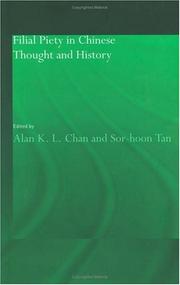
ISBN: 0415333652 Year: 2004 Publisher: New York (N.Y.): RoutledgeCurzon
Abstract | Keywords | Export | Availability | Bookmark
 Loading...
Loading...Choose an application
- Reference Manager
- EndNote
- RefWorks (Direct export to RefWorks)
S12/0375 --- S12/0370 --- Filial piety --- -Conduct of life --- Ethics, Practical --- Morals --- Personal conduct --- Ethics --- Philosophical counseling --- Filial love --- Piety, Filial --- Conduct of life --- Parent and child --- Piety --- China: Philosophy and Classics--Filial piety --- China: Philosophy and Classics--Xiaojing 孝經 --- Conduct of life.

ISBN: 1134328133 1280103752 0203685024 0203413881 9780203413883 0415333652 9781134328086 9781134328123 9781134328130 9780415333658 9780415647779 1134328125 Year: 2004 Publisher: London : RoutledgeCurzon,
Abstract | Keywords | Export | Availability | Bookmark
 Loading...
Loading...Choose an application
- Reference Manager
- EndNote
- RefWorks (Direct export to RefWorks)
This is a multi-disciplinary survey that combines historical studies with philosophical analysis from an international team of respected contributors.
Filial piety --- Conduct of life. --- Ethics, Practical --- Morals --- Personal conduct --- Ethics --- Philosophical counseling
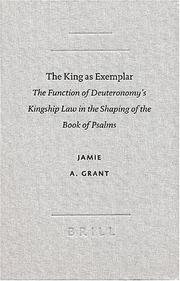
ISBN: 9004130918 9789004130913 Year: 2004 Volume: 17 Publisher: Leiden: Brill,
Abstract | Keywords | Export | Availability | Bookmark
 Loading...
Loading...Choose an application
- Reference Manager
- EndNote
- RefWorks (Direct export to RefWorks)
Kings and rulers --- God --- Piety --- Eschatology --- Biblical teaching. --- Kingship --- Bible. --- Relation to Deuteronomy XVII, 14-20. --- Relation to Psalms. --- Criticism, Redaction. --- Kings and rulers - Biblical teaching. --- God - Kingship - Biblical teaching. --- Piety - Biblical teaching. --- Eschatology - Biblical teaching.
Book
ISBN: 2227474459 9782227474451 Year: 2004 Publisher: Paris: Bayard,
Abstract | Keywords | Export | Availability | Bookmark
 Loading...
Loading...Choose an application
- Reference Manager
- EndNote
- RefWorks (Direct export to RefWorks)
" Si dans ce livre en forme de confession, je souhaite plaider pour un christianisme souple et allègre, ouvert et cordial, humble et pudique, ce n'est pas pour récuser la radicalité de la foi dont se réclament volontiers les jeunes prêtres d'aujourd'hui. Je voudrais au contraire les préserver du raidissement et de l'orgueil qui de tous temps ont perverti les plus belles générosités. La culture à laquelle ils appartiennent est disponible, j'en suis persuadé, à ce que j'appelle un christianisme d'insolence, au sens étymologique du mot, c'est-à-dire un christianisme qui manque d'habitude, un christianisme trop jeune pour se laisser intimider par le ton péremptoire de l'idéologie religieuse et paralyser sous le poids de ses archives. Car quelque chose est en train de se passer. "
248 --- 248 Spiritualite. Ascese. Mystique. Theologie ascetique et mystique. Devotion --- 248 Spiritualiteit. Ascese. Mystiek. Vroomheid --- Spiritualite. Ascese. Mystique. Theologie ascetique et mystique. Devotion --- Spiritualiteit. Ascese. Mystiek. Vroomheid --- 248 Spirituality. Ascesis. Mystic. Piety --- Spirituality. Ascesis. Mystic. Piety
Book
ISBN: 2884820299 9782884820295 9782940402090 9782940402533 2940402531 Year: 2004 Publisher: Genève: Ad Solem,
Abstract | Keywords | Export | Availability | Bookmark
 Loading...
Loading...Choose an application
- Reference Manager
- EndNote
- RefWorks (Direct export to RefWorks)
A force de paroles, il se fait au monde beaucoup d'obscurité. Mais il est une obscurité d'obsidienne, transparente celle-là, que donne la Parole, et c'est celle-là que l'on cherche ici. Commenter l'Ecriture est trop dire : annoter suffit. On ne trouvera ici que des annotations, comme des étincelles surgies du brasier du Verbe. Il s'écrit de par le monde beaucoup de textes, mais combien asphyxient l'âme de ceux qui les lisent, faute d'interstices ! Combien expirent, faute d'avoir laissé la parole à la Parole, et à ce Silence consubstantiel qui lui sert à la fois d'ambassade et de suite ? C'est pourquoi le texte des étincelles est aéré, ajouré. Leur unité de lieu est la cellule (celui qui les écrit voit tout de sa fenêtre qui résume l'espace autant qu'elle rassérène le regard) : leur unité de temps est, d'un avent à l'autre, cet an de grâce qu'il faut au Mystère pour se dérouler, pour nous enrouler à Soi, peu à peu, jusqu'à ce que nous basculions pour de bon dans cet Instant unique où tout est simultané, où tous sont contemporains, Intra in gaudium Domini tui (Mt XXV, 21). Alors il y aura de la joie dans le ciel (Lc 15, 7) : le livre d'étincelles aura transmis le Feu.
248 --- 248 Spiritualite. Ascese. Mystique. Theologie ascetique et mystique. Devotion --- 248 Spiritualiteit. Ascese. Mystiek. Vroomheid --- Spiritualite. Ascese. Mystique. Theologie ascetique et mystique. Devotion --- Spiritualiteit. Ascese. Mystiek. Vroomheid --- 248 Spirituality. Ascesis. Mystic. Piety --- Spirituality. Ascesis. Mystic. Piety --- Logos (Christian theology) --- Word (Theology) --- Word of God (Christian theology) --- Christian life --- Light and darkness in the Bible --- Jesus Christ
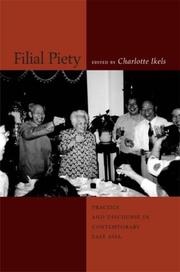
ISBN: 0804747911 0804747903 Year: 2004 Publisher: Stanford (Calif.): Stanford university press
Abstract | Keywords | Export | Availability | Bookmark
 Loading...
Loading...Choose an application
- Reference Manager
- EndNote
- RefWorks (Direct export to RefWorks)
How have rapid industrial development and the aging of the population affected the expression of filial piety in East Asia? Eleven experienced fieldworkers take a fresh look at an old idea, analyzing contemporary behavior, not norms, among both rural and urban families in China, Japan, Korea, and Taiwan. Each chapter presents rich ethnographic data on how filial piety shapes the decisions and daily lives of adult children and their elderly parents. The authors' ability to speak the local languages and their long-term, direct contact with the villagers and city dwellers they studied lend an immediacy and authenticity lacking in more abstract treatments of the topic. This book is an ideal text for social science and humanities courses on East Asia because it focuses on shared cultural practices while analyzing the ways these practices vary with local circumstances of history, economics, social organization, and demography and with personal circumstances of income, gender, and family configuration.
S12/0375 --- S12/0370 --- Kinship --- -Family --- -Households --- Parent and adult child --- -Filial piety --- -Adult children of aging parents --- -Aging parents --- -Elderly parents --- Parents, Aged --- Parents --- Sandwich generation --- Aging parents' adult children --- Children of aging parents --- Aging parents --- Filial love --- Piety, Filial --- Conduct of life --- Parent and child --- Piety --- Adult child and parent --- Adult children and parents --- Parent-adult child relations --- Parents and adult children --- Adult children living with parents --- Population --- Families --- Home economics --- Family --- Family life --- Family relationships --- Family structure --- Relationships, Family --- Structure, Family --- Social institutions --- Birth order --- Domestic relations --- Home --- Households --- Marriage --- Matriarchy --- Parenthood --- Patriarchy --- Ethnology --- Clans --- Consanguinity --- Kin recognition --- China: Philosophy and Classics--Filial piety --- China: Philosophy and Classics--Xiaojing 孝經 --- Care --- -Social aspects --- Social conditions --- East Asia --- -Asia, East --- Asia, Eastern --- East (Far East) --- Eastern Asia --- Far East --- Orient --- Social life and customs --- Adult children of aging parents --- Filial piety --- Social life and customs. --- Social aspects --- Asia, East
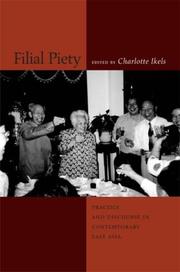
ISBN: 0804767165 1417519444 9781417519446 9780804767163 0804747903 0804747911 9780804747905 9780804747912 Year: 2004 Publisher: Stanford, Calif. : Stanford University Press,
Abstract | Keywords | Export | Availability | Bookmark
 Loading...
Loading...Choose an application
- Reference Manager
- EndNote
- RefWorks (Direct export to RefWorks)
How have rapid industrial development and the aging of the population affected the expression of filial piety in East Asia? Eleven experienced fieldworkers take a fresh look at an old idea, analyzing contemporary behavior, not norms, among both rural and urban families in China, Japan, Korea, and Taiwan. Each chapter presents rich ethnographic data on how filial piety shapes the decisions and daily lives of adult children and their elderly parents. The authors’ ability to speak the local languages and their long-term, direct contact with the villagers and city dwellers they studied lend an immediacy and authenticity lacking in more abstract treatments of the topic. This book is an ideal text for social science and humanities courses on East Asia because it focuses on shared cultural practices while analyzing the ways these practices vary with local circumstances of history, economics, social organization, and demography and with personal circumstances of income, gender, and family configuration.
Kinship --- Families --- Households --- Parent and adult child --- Filial piety --- Adult children of aging parents --- Aging parents --- Aging parents' adult children --- Children of aging parents --- Sandwich generation --- Filial love --- Piety, Filial --- Conduct of life --- Parent and child --- Piety --- Adult child and parent --- Adult children and parents --- Parent-adult child relations --- Parents and adult children --- Adult children living with parents --- Population --- Home economics --- Family --- Family life --- Family relationships --- Family structure --- Relationships, Family --- Structure, Family --- Social institutions --- Birth order --- Domestic relations --- Home --- Marriage --- Matriarchy --- Parenthood --- Patriarchy --- Ethnology --- Clans --- Consanguinity --- Kin recognition --- Care --- Social aspects --- Social conditions --- East Asia --- Asia, East --- Asia, Eastern --- East (Far East) --- Eastern Asia --- Far East --- Orient --- Social life and customs.
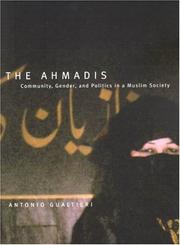
ISBN: 1282861964 9786612861963 0773572058 0773527370 9780773527379 0773527389 9780773527386 9780773572058 9781282861961 6612861967 Year: 2004 Publisher: Montreal : McGill-Queen's University Press,
Abstract | Keywords | Export | Availability | Bookmark
 Loading...
Loading...Choose an application
- Reference Manager
- EndNote
- RefWorks (Direct export to RefWorks)
Dedicated to supernatural revelation and the divine governance of society, Pakistan's Ahmadi community has endured mob violence and penal sanctions for refusing to embrace the beliefs of the Sunni majority. They disagree with fundamentalist ideas of exclusiveness and consider themselves a reformed version of Islam. Although they have adopted Enlightenment ideas about the pursuit of scientific knowledge and produced a notable number of technicians, doctors, and scientists, women continue to live under a strict definition of purdah and the community remains conservative. The Ahmadis reveals a society strictly grounded in divinely prescribed patterns - including parental authority, close family ties, a disposition towards gender-specific roles, and separation of the sexes - but at odds with fanatical Muslim fundamentalism, whose wrath has spread beyond the Ahmadi minority to include the West.
Ahmadiyya members --- Ahmadiyya. --- Aḥmedīya --- Qadiani --- Qadiyani --- Islamic sects --- Ahmadiyya --- tradition and modernity --- community --- piety and religious life in Rabwah --- social life and institutions --- Purdah and vocation --- politics --- Islam --- the Ahmadis --- harassment and persecution --- gender --- Muslim society
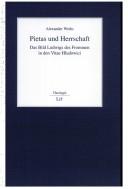
ISBN: 3825874508 9783825874506 Year: 2004 Volume: 65 Publisher: Munster: Lit,
Abstract | Keywords | Export | Availability | Bookmark
 Loading...
Loading...Choose an application
- Reference Manager
- EndNote
- RefWorks (Direct export to RefWorks)
Piety in literature. --- Kings and rulers in literature --- Piété dans la littérature --- Rois et souverains dans la littérature --- Louis --- Thegan, --- Astronomus, --- Biography --- Early works to 1800. --- Piété dans la littérature --- Rois et souverains dans la littérature --- Louis le Pieux, empereur
| Listing 1 - 10 of 14 | << page >> |
Sort by
|

 Search
Search Feedback
Feedback About UniCat
About UniCat  Help
Help News
News